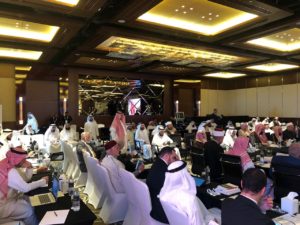The International Islamic Fiqh Academy Conference 2019 Discusses 15 Research Papers In Its First Day
The 24th session of the International Islamic Fiqh Academy Conference, held under the patronage of H.H. Sheikh Mohammed bin Rashid Al Maktoum, Vice President and Prime Minister of the UAE and Ruler of Dubai, and organised and hosted by the Islamic Affairs and Charitable Activities Department in Dubai (IACAD) discussed 15 research papers within three sessions in its first day. The sessions were held in the presence of H.E. Dr. Hamad Bin Al Shaikh Ahmed Al Shaibani, Director General of the Islamic Affairs and Charitable Activities Department in Dubai (IACAD), Dr. Abdulsalam Al-Abbadi Secretary General of the International Islamic Fiqh Academy (IIFA), H.E. Dr. Saleh Bin Abdullah Bin Humaid, President of the IIFA, H.E. Dr. Yousef bin Ahmad Al-Othaimeen Secretary-General of the Organisation of Islamic Cooperation (OIC), along with a group of scientists, researchers, opinion and thought leaders, and experts from the Arab and Islamic world.
H.E. Dr. Hamad Bin Al Shaikh Ahmed Al Shaibani stressed the importance of the Conference discussions to respond to the accelerated technological and scientific development in several fields and precisely in the economic and financial fields. The discussions of the Conference are gaining increased importance as they provide the Sharia and Fiqh view regarding various topics that are relevant to Muslims across the world.
H.E. Dr. Hamad Bin Al Shaikh Ahmed Al Shaibani said: “In the first day of the Conference, the sessions discussed various key topics, such as smart contracts and their connection to digital currencies, and inflation and change in value of currencies. The research papers presented within the Conference provided the scientists and experts attending these sessions with a comprehensive view to those topics from various Fiqh, Sharia, scientific and economic points of view. These discussions emphasize the importance of Dubai as the capital of the Islamic economy.”
The first and second scientific sessions of the conference discussed the issue of smart contracts and how to activate and terminate them, and the extent to which they relate to the subject of digital currencies, in the presence of a group of scientists and researchers specialised in this issue. H.E. Dr. Mohammed Abdul Ghaffar Al-Sharif presented the first scientific session, while H.E. Dr. Ayash Fadad played the role of the rapporteur. During this session, five research papers were reviewed on this issue, dealing with the fundamentals and purposes of smart contracts, their relationship to digital currencies, their concept, their pillars and features, and the perspective of Islamic Fiqh regarding the smart electronic modes.
H.E. Dr. Insaf Ayoub Al-Momani presented the second scientific session, while H.E. Dr. Irwan bin Mohammed Sabri, played the role of the rapporteur. The second scientific session presented four research papers on this issue, which focused on the concept of smart contracts, and defining them from a Shari’a perspective. Due to the rapid technological developments on one hand and the complexity of financial transactions forms from the professional and technical angle on the other, defining smart contracts is done by applying the analogical reasoning and then stating the fatwa. The session discussed the reality of smart contracts in this age and how they are drafted and terminated. It also discussed their relationship to virtual currencies, which is one of the most prominent applications of Blockchain, and the future implications of this relationship.
The third and final scientific session of the first day discussed the issue of monetary inflation and change in currency value. H.E. Dr. Aayad bin Nami Al-Selmi presented the session, while H.E. Dr. Mohammed Abdul Halim Omar played the role of the rapporteur. During the session, six research papers were discussed on this issue, which focused on linking rights and obligations to price change, Fiqh solutions to address the effects of inflation with accounting interpretation and analysis, the effects of monetary inflation and how to address it jurisprudentially and economically, and the problems of cash money in the context of inflation situations from the Islamic perspective. That, in addition to the role of the principle of “reconciliation” in the handling inflation in the era of near money, and the negative effects forced by inflation on societies.
The second day of the International Islamic Fiqh Academy Conference will witness five scientific sessions discussing various topics including: FIDIC contracts and their impact on modern contracts in Arab countries, tolerance in Islam and its social and international necessity and effects, the achievement of food and water security and its effects on Future challenges in Islamic countries, the human genome and future bioengineering, as well as discussing the recommendations of the sessions held by the Academy in the last three years. Also, the final statement of the Academy, resolutions and recommendations issued by the Academy will be issued on Wednesday (November 6th).









